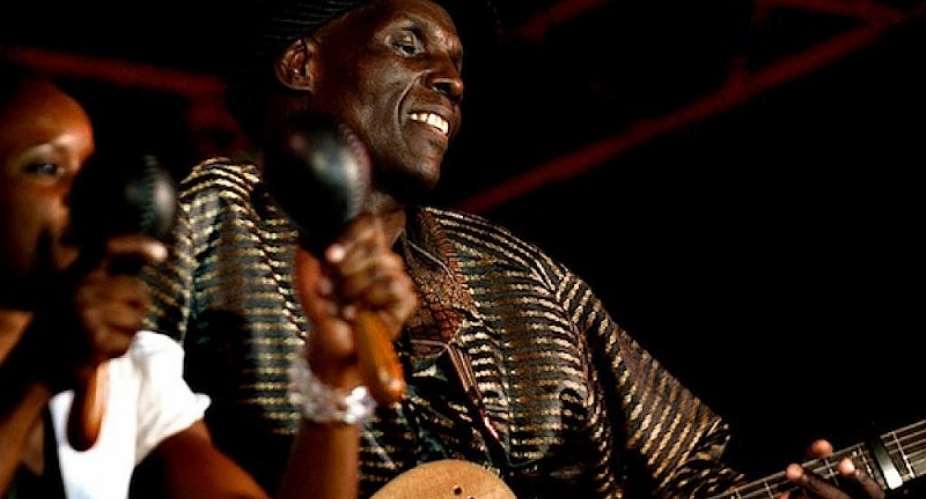Tributes have been flowing for the acclaimed Zimbabwean Afro-jazz artist Oliver 'Tuku' Mtukudzi who died on Wednesday aged 66.The self-taught guitarist and songwriter died at a hospital in Harare after succumbing to diabetes complications.
Mtukudzi started out recording music aged 23 as a member of the Wagon Wheels alongside Thomas Mapfumo. He became a legend in cross-genre music of Afro-jazz, releasing 66 albums in his more than four-decade career, most with his own band The Black Spirits.
Singing mainly in his native Shona, his music brought Zimbabwe into the homes and hearts of people not just back home but around the world.
The presidents of Zimbabwe and South Africa took to twitter to pay hommage.
Zimbabwean Minister of Education David Coltart said: "If anyone ever made me proud to be Zimbabwean it was you. Thank you for making us happy for so long, especially during the darkest days".
Social messages
Mtukudzi's unique sound - dubbed “Tuku music” - was a blend of styles including the Zulu-rooted mbaqanga from South Africa, and drew on a range of instruments like Zimbabwe's mbira (thumb piano).
His lyrics often carried social messages: the song Todii talked about the stigma attached to HIV and AIDS while others evoked alcohol abuse and the need to encourage self-respect.
One of his biggest hits was the timeless song Neria (Widow) about the pain of losing some you love. “Don't be disheartened Neria, God is with you,” he sings. “May your heart be strong.”
It became the official soundtrack of the 1993 film Neria, about a woman struggling in the suburbs of Harare, exploited by her family following the death of her husband. Mtukudzi starred as the widow's brother.
Mtukudzi rarely sang overtly about Zimbabwe politics, although the song Wasakara (You're getting old) is believed to have referred to the long-serving Zimbabwean ruler Robert Mugabe.
Tributes to 'a father figure'
The multi-award winning artist also actively encouraged the new generation of Zimbabwean musicians via the Pakare Paye Arts Centre that he built in Norton, a town near Harare.
“It's too much, we've lost a father, literally a father,” Zimbabwean musician McDonald Chidavaenzi told SABC.
“He would treat us like sons. You ask yourself who's going to be our father in the music industry. Who's going to keep us sane when we lose control.”
Musician Tatenda Mahachi, meanwhile, remembered him as “a humble guy: a father, a friend [who] taught me a lot of things. We worked as if we were on the same level”.
An African diamond
Tuku played with a host of musicians outside of Zimbabwe too, including the late Hugh Masekela, known affectionately as Bra Hugh, and who died exactly one year ago.
Lesotho-born jazzman Bhudaza Mapefane told SABC he was “going to try and build from where Tuku left, like with Bra Hugh,” adding they'd be "working on his music because he really was an innovator”.
Veteran singer Tsepo Tshola, also from Lesotho, paid tribute to Mtukudzi's huge contribution to music.
“Tuku was so versatile. I love his music and he gave his performances with love. He was such a soft-spoken, very humble person. He's created so much unity amongst us. I will miss him a lot. We've just lost an African diamond, we've lost a giant.”
Born to sing
Tuku may have shone out, but he'd suffered a lot too, and knew how to express that in his music.
In 2010 he lost his son and fellow band member, Sam, in a car accident. It took him two years to begin writing songs again and when he did it was Sarawoga (Left on my own) .
He was also famed for his philanthropy and commitment to human rights, and served as a goodwill ambassador for the UN's children's agency UNICEF.
In an interview with the AFP news agency last March, he played down the acclaim, saying "I don't even understand the word celebrity".
He said he preferred the words of his mother, who declared he would never sing a note better than his first scream at birth.
"It means when I was born I'd already started singing. This is who I am."





 We’ll no longer tolerate your empty, unwarranted attacks – TUC blasts Prof Adei
We’ll no longer tolerate your empty, unwarranted attacks – TUC blasts Prof Adei
 Bawumia donates GHc200,000 to support Madina fire victims
Bawumia donates GHc200,000 to support Madina fire victims
 IMF to disburse US$360million third tranche to Ghana without creditors MoU
IMF to disburse US$360million third tranche to Ghana without creditors MoU
 Truck owner share insights into train collision incident
Truck owner share insights into train collision incident
 Paramount chief of Bassare Traditional Area passes on
Paramount chief of Bassare Traditional Area passes on
 Two teachers in court over alleged illegal possession of BECE papers
Two teachers in court over alleged illegal possession of BECE papers
 Sunyani: Victim allegedly shot by traditional warriors appeals for justice
Sunyani: Victim allegedly shot by traditional warriors appeals for justice
 Mahama vows to scrap teacher licensure exams, review Free SHS policy
Mahama vows to scrap teacher licensure exams, review Free SHS policy
 Government will replace burnt Madina shops with a new three-story, 120-store fac...
Government will replace burnt Madina shops with a new three-story, 120-store fac...
